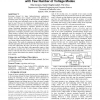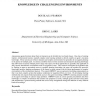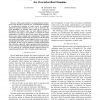1047 search results - page 9 / 210 » Learning the required number of agents for complex tasks |
ISLPED
2004
ACM
14 years 1 months ago
2004
ACM
Increasing demand for larger high-performance applications requires developing more complex systems with hundreds of processing cores on a single chip. To allow dynamic voltage sc...
ATAL
2010
Springer
13 years 8 months ago
2010
Springer
Requirements Driven Agent Collaboration (RDAC) is a mechanism where the self-interested service agents actively and autonomously search for the required services submitted by the ...
CI
2005
13 years 7 months ago
2005
Autonomous agents that learn about their environment can be divided into two broad classes. One class of existing learners, reinforcement learners, typically employ weak learning ...
IROS
2007
IEEE
14 years 1 months ago
2007
IEEE
Abstract— This paper presents a learning-enhanced marketbased task allocation approach for oversubscribed domains. In oversubscribed domains all tasks cannot be completed within ...
CORR
2010
Springer
13 years 6 months ago
2010
Springer
—Autonomous wireless agents such as unmanned aerial vehicles, mobile base stations, or self-operating wireless nodes present a great potential for deployment in next-generation w...




